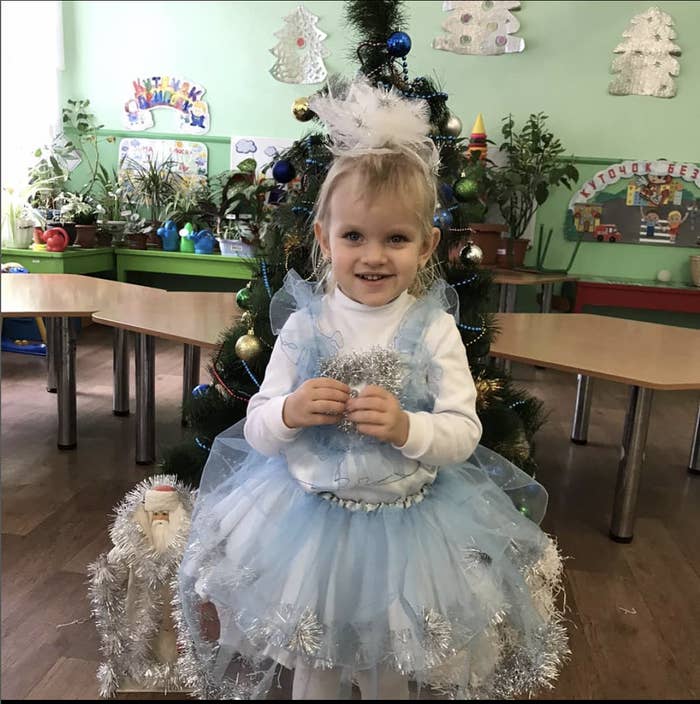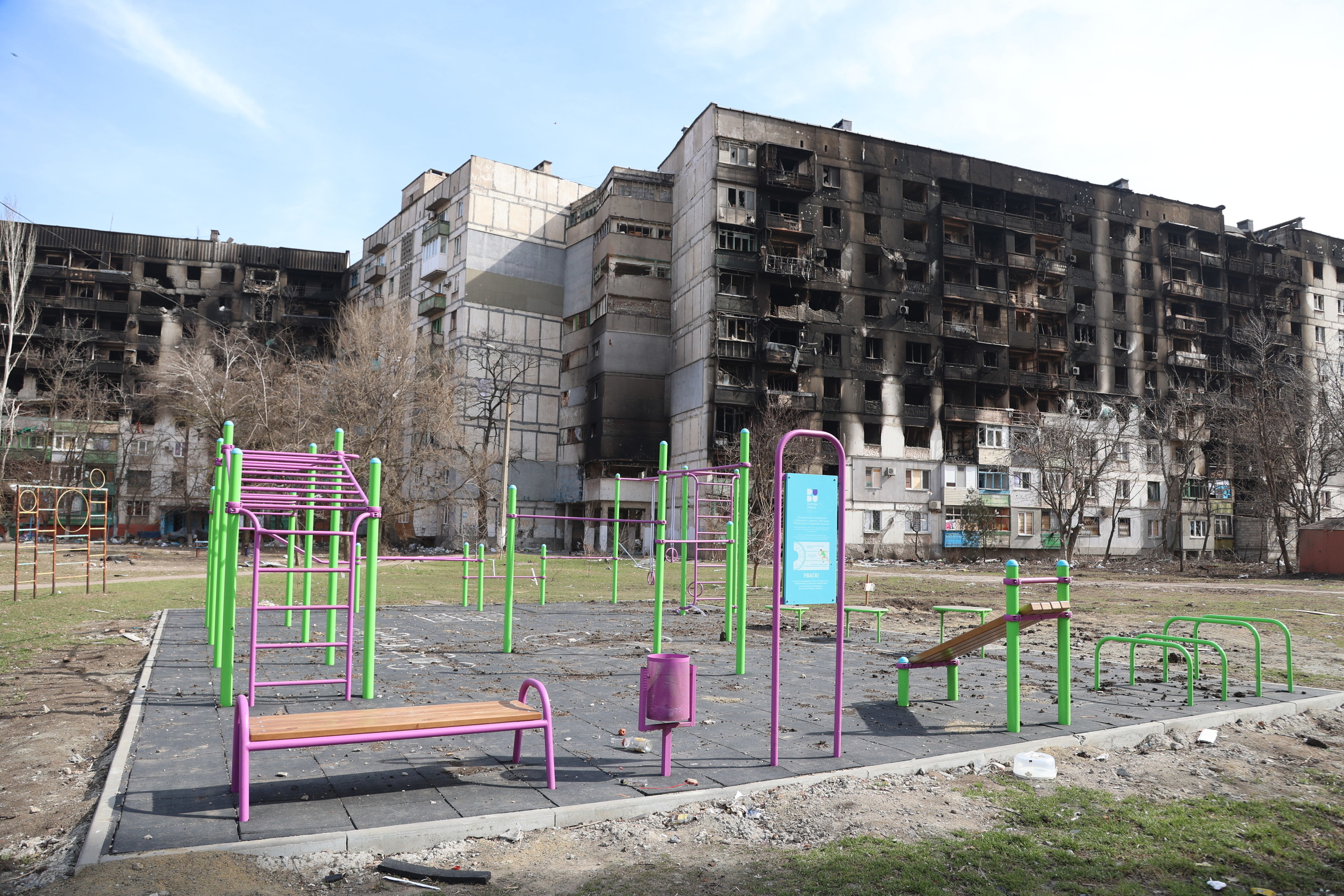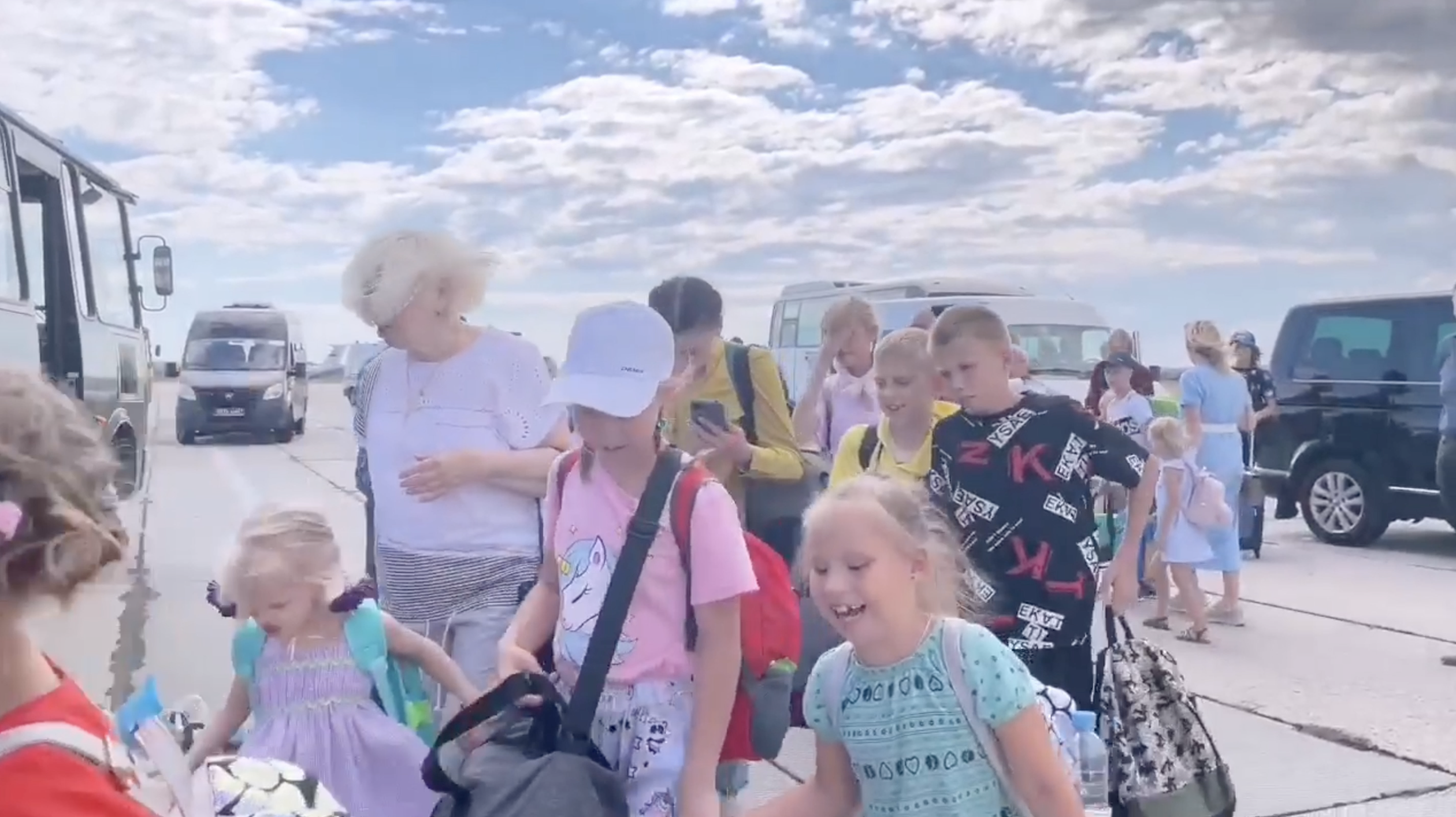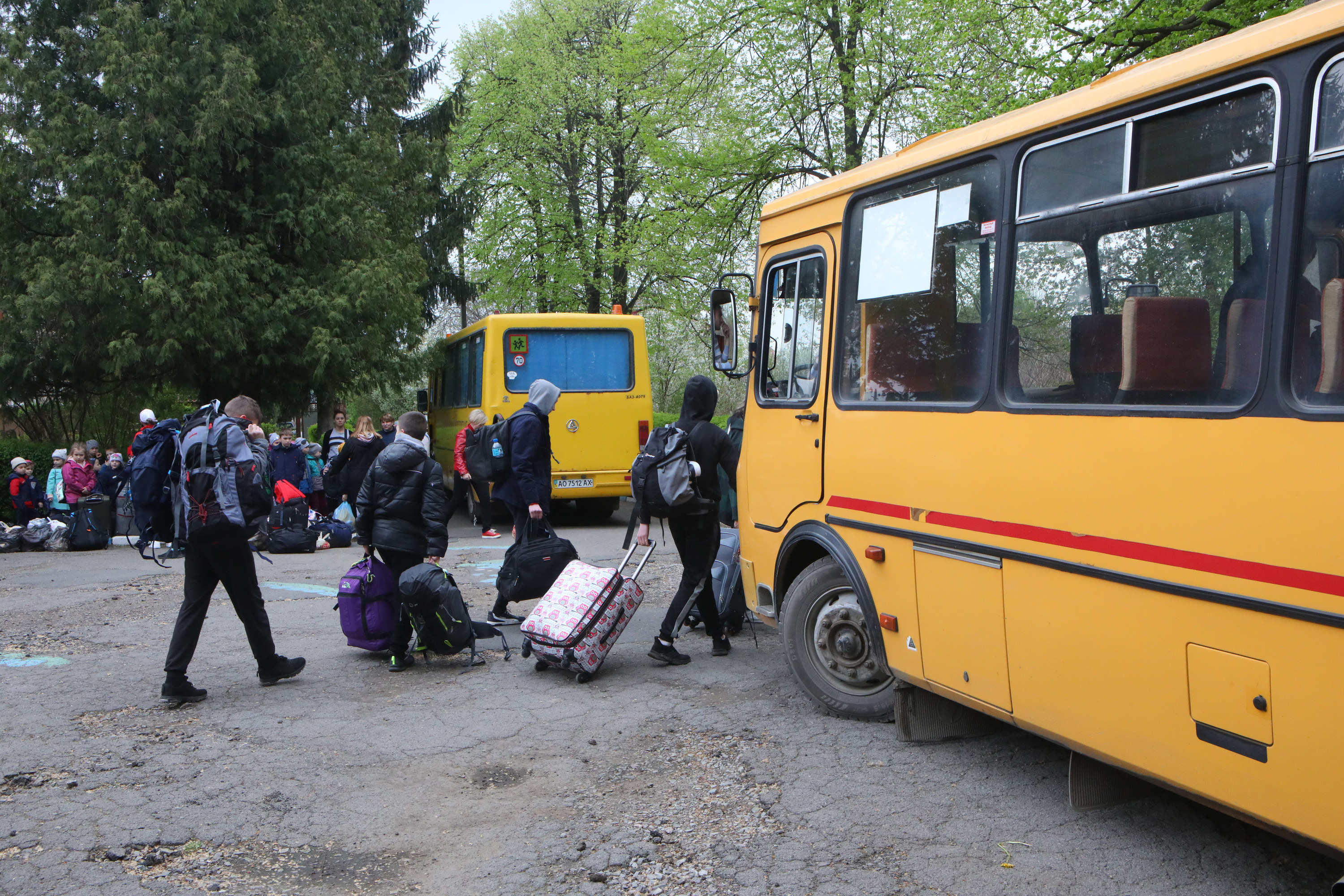
Tatiana Tolstokorova, 56, was sure she recognized Nastya, her missing 3-year-old granddaughter, in a video posted on July 14 on social media by the presidential commissioner for children's rights in Russia, Maria Lvova-Belova. The video showed a large group of little children getting off of buses and being greeted by their new adoptive parents. Tolstokorova hadn’t seen Nastya since their hometown of Mariupol, in eastern Ukraine, was bombed four months ago.
“Thirteen little peas, in identical suits, were waiting for us at the porch of the foster home to go to Russia to be with foster moms and dads,” stated the caption on the video, posted on VKontakte, known as “the Russian Facebook.” “By the end of the week, 108 orphans from Donbass who received Russian citizenship will have parents.”
Tolstokorova was in shock.
“Dear Maria, my granddaughter is there, I recognized her,” Tolstokorova commented on the post. “For the love of all that is holy, give me my star!”
Tolstokorova posted dozens of comments in the following hours, on VKontakte and Telegram, where the Children's Ombudsman also shared the video.
"Russia don't take our children away from us, we are their living relatives," she wrote.
Her persistence paid off: Lvova-Belova’s office responded, though not with the news Tolstokorova had hoped for. A representative from the office said that the girl in the video was not Nastya. She was a girl named Arina, one of the more than 200 children and adults taken from an orphanage in Amvrosiivka, a city in the occupied territory of the Donetsk region, to Kursk, Russia, on Feb. 20, four days prior to the official beginning of the war. Arina and 107 other children would go up for adoption in Russia, where they will get citizenship and the adults who take them in will receive a stipend more than four times the minimum wage.
Lvova-Belova’s office did not respond to a list of questions for this story.
The transport of Ukrainian orphans to Russia has raised concerns among social workers, lawyers, and officials at local and international organizations. Around 30 of them told BuzzFeed News that they fear this trend is part of Vladimir Putin's larger strategy to empty the territories his military forces are trying to occupy and take control of the younger population by deporting them to territories that are already under Russian control. While advocates have accused Russia of violating Geneva Convention and UN standards that prohibit transferring children across state lines, Tolstokorova’s experience interacting with Russia’s Commissioner for Children's Rights offers one of the first on-the-ground accounts of how this process plays out.
“One of the elements of a genocide is taking children from one group and turning them into the other group. And we feel that we do see that this is happening,” said Aagje Leven, secretary general at Missing Children Europe, the leading organization investigating disappearing minors in Ukraine.
While many kids in Ukraine’s orphanages were there before Russia’s invasion, an untold number have ended up at these facilities amid the chaos of war and may have living relatives able to take them in. At least 200,000 Ukrainian children are currently missing, according to former Human Rights Commissioner of the Ukrainian Parliament Liudmyla Denisova, though the number may be an undercount as it doesn’t include kids without living family members to file a report. At least 5,600 children have been forcibly deported to Russia, Deputy Interior Minister Kateryna Pavlichenko reported on July 29.
A provision in the United Nations Convention on the Rights of the Child bars “the illicit transfer and non-return of children abroad” and the UN’s Convention on the Prevention and Punishment of the Crime of Genocide forbids “forcibly transferring children of the group to another group.”
“In violation of international humanitarian law and basic standards of humanness, Russia is engaged in state-organised kidnapping of children,” the Ukrainian Foreign Ministry said in a statement.
Nastya is still among those missing.

Tolstokorova last saw her son, daughter-in-law, and granddaughter, Nastya, on March 12, hours before she was awakened by bombs dropping at 4 a.m. the next day. She’d lived across the street from them.
“I ran in there. I was sick. I was in shock. I was screaming in the street,” Tolstokorova told BuzzFeed News while sitting in her same old apartment, whose structure survived despite the damage. It took around 15 minutes for Tolstokorova to get outside of her own home and get to the front door of her son’s building. She was by herself; her husband was disabled and could barely walk. “There was a man lying in the entryway, a neighbor from the third floor,” she said.
She climbed the stairs at her son’s, shouting, calling for her family, but no one responded. There were no fire units, no emergency services. Ukrainian authorities were in exile, she said, and only the Ukrainian and the Russian military were there to collect their respective corpses when it was possible. “There was no one in town who could help,” she said.
For over four months, no one paid any attention to Tolstokorova’s case. She broke into official buildings in Mariupol: the city hall, the district administration, the prosecutor’s office. She went to hospitals and local NGOs. She asked for lists of civilians, dead or deported. There were either no such records or no one was willing to give away any list of names.
Mobility was restricted in her hometown, Mariupol, now under Russian control. The city was 90% destroyed, according to the city’s mayor. They were out of power, gas, and water for several weeks. Street signs were changed into Russian. People who wanted to leave were put in what became known as “filtration camps,” a sort of temporary concentration camp to allow for screening before the refugees were allowed to enter Russia. Human rights organizations have reported tortures and killings in those camps, so it was out of the question for Tolstokorova and her disabled husband to go through those, fearing for their lives.
But when the internet connection was partially reestablished in mid-April, Tolstokorova traveled around town trying to catch some signal to find any sort of hint of her family members being alive. Her struggles were scarcely rewarded, but it was enough to give her hope: Tolstokorova’s emails to her son, Pasha, had previously been sent back, but now they were going through. And most promisingly, an acquaintance alerted her that her daughter-in-law, Olya, was online on Vkontakte on May 18. By the time Tolstokorova managed to get online, Olya was gone, but the timestamp of her last connection remained.
So when Tolstokorova found that video from Lvova-Belova, she thought that was the ultimate proof that the three members of her son’s young family were alive — and, she thought, they had probably been separated and taken by the Russians. But at least they were alive.

After posting her comments on the orphans video, Tolstokorova received a phone call from Alexey Gazaryan, an aide to Maria Lvova-Belova who lists his title on LinkedIn as the president of Foster Aid Development Fund in Moscow. Gazaryan invited her and her husband to Moscow to watch the rough cut of the original video she had seen online in full length and high quality, Tolstokorova recalled. She explained she couldn’t leave Mariupol, and after a long conversation, they found a solution: Two lifelong neighbors who were in Moscow would go to the Russian administration and watch the video on her behalf.
“These people knew Nastya from birth,” Tolstokorova said. “She used to run to them a lot because they gave her Chupa Chups.”
The neighbors confirmed that the girl on the video was not Tolstokorova’s granddaughter. Nastya and Arina are around the same age, with similar hair and facial features, but the former had blue eyes and the girl in the video had brown eyes, a difference barely visible on the video released. Russian officials also showed them documents stating that the girl's name was Arina and that she had arrived in Russia from the Amvrosiivka orphanage four days before the war.
Tolstokorova passed on the information that Nastya was missing to Magnolia NGO, the Ukrainian partner of the larger Missing Children Europe network. They registered all the information she was able to provide and are currently investigating the case.
Magnolia has received reports of 2,367 missing children as of July 2022, 10 times more than last year.
Most of them, over a dozen sources suspect, are part of the 121,000 institutionalized children in Ukraine, which is one of the countries in Europe with the highest rates of children deprived of family care. It’s the heritage of a Soviet system where low-income families put the children they couldn’t support into orphanages and public boarding schools. Half of the institutionalized children have disabilities, many related to fetal alcohol syndrome, and around 80% of them have what UNICEF calls “traceable families.”
One problem is it’s hard for the Ukrainian administration to keep an accurate count of children in orphanages: When the Russian invasion started, children whose living relatives could be contacted were sent back home, but, at the same time, other children came in as they lost their families to the war.
For Nastya, for example, even if her parents are not found, her grandmother will always have priority to claim guardianship over any potential adoptive family.
Arina's fate, however, was different, as she was considered an orphan. She was part of a group of 234 children and teachers that were taken from Amvrosiivka General Education Boarding School No. 4, the only orphanage in the town of 18,000 in the Donetsk Oblast. They were put on buses and driven along a route that, prior to the war, would have taken up to 12 hours. Their destination was Kursk, Russia.
“We evacuated everyone. It was, of course, a long trip, but we convinced the children that it was safe, such an excursion for them. We were received very cordially and we did not expect that,” said Oksana Plotnitskaya, director of the boarding school in Ukraine, who traveled with the children under her custody, according to local media.
Marina Lypovetska, responsible for project implementation and a cornerstone of Magnolia NGO, disputes the word choice:
“Evacuation is an official word, which means that our [Ukrainian] government organized it. Our government can't organize evacuations to Russia because we are at war with them; you know, it is impossible,” she said.
Upon their arrival, children were split into groups going to four different centers, as reported on Feb. 20 by Anastasia Gurina, the press secretary of the Kursk governor. 106 of them were placed in the Klyukvinskaya boarding school, while 35 of them, including 12 with disabilities, were placed in the Kursk Rehabilitation Center. The rest are currently split between boarding school No. 4 in Kursk and Dmitrievskaya boarding school.
But orphanage groups can’t be separated while outside of their home country and can’t be adopted, according to Magnolia NGO. 108 of the children originally placed in the Russian boarding schools were given up for adoption on July 14.
President Volodymyr Zelensky of Ukraine passed a moratorium on intercountry adoptions at the beginning of the war. But in May, Putin signed a decree to simplify the procedure for orphans from the Donetsk and Luhansk People's republics to obtain Russian citizenship. Heads of orphanages will also be able to apply for citizenship for children.
“We can't put a child up for adoption when the parents will say, Wait, where are my children? There's such a high risk of trafficking,” Rebecca Smith, global head of Child Protection Programmes for Save the Children, told BuzzFeed News.
The Organization for Security and Cooperation in Europe reported on July 14 that orphaned children are being transferred to Russia. And the UN high commissioner for human rights, Michelle Bachelet, noted concerns about Russian authorities dismissing steps for family reunification.
On principle, all unaccompanied and separated children in a zone of conflict are presumed to have living relatives or legal guardians, according to UNICEF.
But Russian families volunteer to participate in unverified adoptions, according to three sources.
“A lot of Russian NGOs are using that propaganda and saying ‘we are saving them’ [Ukrainian children]. And so that makes it very hard for us to work with those organizations,” Smith said of her work with Save the Children.
There are two categories of adoptive families, according to the Russian Administration, each entitled to different kinds of benefits: “guardians” receive a one-time payment that can be up to 100,000 rubles ($1,684), plus a monthly allowance of 29,000 rubles ($480) and the reimbursement of utilities. The second kind, “adopting parents,” receive all of the above as well as a monthly salary from the state. Some families shared online how they took up to nine siblings: that total monthly stipend would equal 34 times the minimum wage in Russia.

Lvova-Belova’s office became proactive, offering to help Tolstokorova find her granddaughter, she recalled.
“She said, Not to worry, we will do everything, we will help, you won't be left alone,” Tolstokorova said of her early conversations with Lvova-Belova.
They included Nastya’s name on a search program where they look for missing people throughout all regions of Russia.
Tolstokorova wonders whether they might have taken her family to a faraway village in the vast Russian countryside, where they could be trapped and cut off from communication because Ukrainian phones haven’t worked in Russia since the start of the war. She worries they are wounded in a Russian hospital, or that Nastya is in another Russian orphanage.
She filed a missing persons report to the Red Cross in May, and it recently told her the organization was just now getting to her case due to a heavy backlog.
Tolstokorova said she is sure her son, daughter-in-law, and granddaughter are alive somewhere in Ukraine or Russia.
In May, around a month and a half after her family disappeared, Tolstokorova and others in Mariupol started clearing the street of corpses and debris. She still remembers the odor that burning corpses release.
At her son’s building, there were some dead bodies in the different apartments, but not all the neighbors were there, and there were no traces of corpses at her son’s unit. The building had no basement. Only one body was found in the entryway. Tolstokorova started to think that a group of neighbors, including her relatives, had managed to escape.
“There was no such smell,” she said. “Thank god we did not find anyone there.” ●
Anastasiya Orlova contributed reporting for this story.
